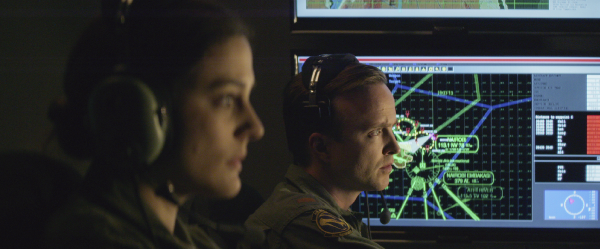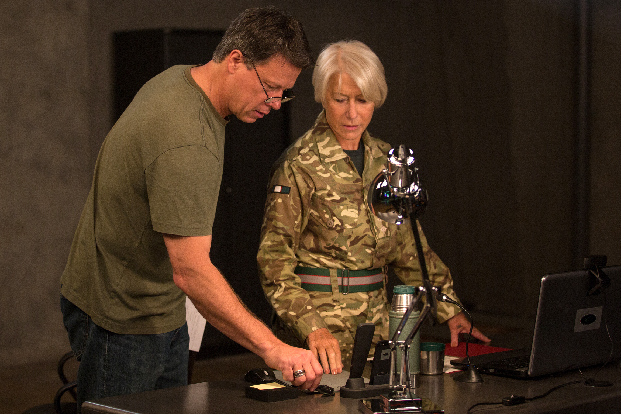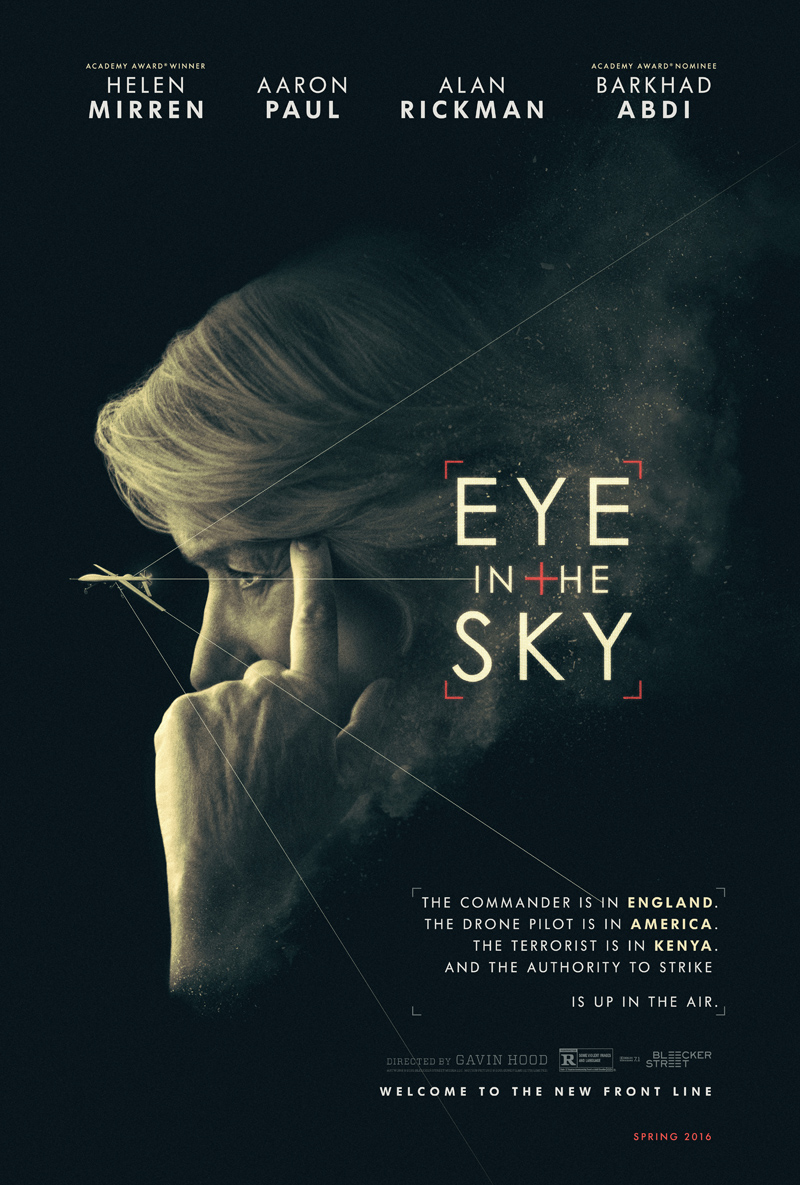Emotionally and systematically debating the political and technical factors that influence the use of drone strikes is a vital means to protecting innocent lives around the world from potential harm from their country’s enemies. But the moral and legal implications that can possibly arise from the well-intentioned plans have the potential to put even more lives at risk, as policy-makers weigh the consequences of their decisions that arise from using the latest technology. The machines that are meant to save civilians, such as drones, could essentially harm them if they’re inadvertently too close to where they’re set off. The decision to utilize technology for the sake of protecting the innocent should be made with respect and compassion for all human beings, no matter where it’s set to be used in the world, and is powerfully showcased in the new war drama, ‘Eye in the Sky,’ which was written by Guy Hibbert.
‘Eye in the Sky’ follows Colonel Katherine Powell (Helen Mirren), a UK-based military officer who has been tracking a British citizen-turned-terrorist for the past six years. The military leader discovers her target is in Kenya, with the help of high-tech American drone surveillance. As Special Forces troops close in to capture the terrorist and her allies, Powell discovers through remote surveillance and on-the-ground intel that the targets are planning a suicide bombing.
As Las Vegas-based 2nd Lieutenant Steve Watts (Aaron Paul) is about to engage his drone at the safe house where the terrorists are found, a nine-year old girl enters the kill zone. He ultimately refuses to continue his mission until a way to protect her is found. His decision to try to save her life triggers an international dispute that reaches the highest levels of US and British government, and they’re forced to debate the moral, political and personal implications of modern warfare.
Mirren, Paul and the thriller’s director, Gavin Hood, generously took the time recently to participate in a press conference at New York City’s Waldorf Astoria Hotel. Among other things, the actors and helmer discussed the drastically different personal and professional implications and effects the drama’s drone attack would have on the Colonel and 2nd Lieutenant after the story’s events unfolded. They also spoke about how during their research process, they spoke to real government personnel, including a drone pilot and military advisor, on how their characters would really act during such a high-pressure situation caused by a potentially deadly international conflict.
The actors and director contemplatively began the press conference by pondering whether or not Mirren and Paul’s characters would be able sleep after the difficult ethical and legal decisions they had to make during the course of the film. The Emmy Award-winning actor admitted that for the 2nd Lieutenant he portrayed, “I think the easy answer is no. Putting myself in that situation, I don’t know if I could sleep. But that is the price you have to pay (for) serving your country (and) doing your duty.” Hood supported the performer’s firm answer, saying “I’m glad Aaron says he wouldn’t sleep…I think that’s the point” of the film.
But the Oscar-winning actress revealed that “I would say yes. I think my character would sleep, absolutely.” Mirren added that she believes the Colonel would “sleep really well because it her job was done. Thank God we got (the terrorists).’ While the circumstances were terrible, “that was the price we had to pay.”
The group was then asked if they all thought if Powell and Watts would speak to each other if they were given the opportunity after the events featured in the conclusion of the war film, and if so, what they would talk about. “They might. I don’t know the protocol or how they’d find themselves in the same bar at the same time, however,” Mirren revealed. But if they did, she believes her character would tell his character, “’Next time Lieutenant, you do what I say when I say to do it.’…I suspect people like my character have to (say that) and carry on.”
Paul agreed with his co-star, noting that “There are many of those situations.” But he added that he doesn’t think that Watts would “want to reopen those wounds, but they did experience something pretty traumatic together. He did what he had to do. He was trying to buy some time in order to hopefully save this young girl’s life.”
‘Eye in the Sky’s director also chimed in on the discussion, stressing the fact that Watts is the pilot in command of the mission, so he’s the person “responsible for releasing the weapon. I have the right to ask for the CD to run again. He can also say, ‘I will not release my weapon until that happens.’” Hood explained that “There’s a line that the (drone pilots) are all trained to say; we didn’t make that up.” Like Watts, pilots have the right to question a direct order they have, “not just for (their) own conscience, but also from a war crimes point of view. (They) have to ensure that they’re following a legal order.”
Watts also believes that Powell “is bending the rules too much. So not only is he allowed to, but he is also required to, question her choice of tactics, because he is the final person,” the thriller’s helmer also explained. “The trainer of the drone pilots that I interviewed said to me, ‘It doesn’t matter if it’s the President on the line’” who’s giving the order. If the pilot has an opposition to an order, he has to give them that phrase.
“So when (Powell) says that, he’s actually doing the right thing. Now do all drone pilots do the right thing? Are most intimidated by someone as intimidating as the Colonel? Probably yes, but I did speak to drone pilots who have taken that route,” Hood revealed. The director not only spoke to drone pilots, but also “F-16 pilots who have declined to drop their payload.”
The filmmaker added that he “spoke to one (F-16 pilot) who knew that his target in Iraq was wrong when he was flying over it, and that they got the coordinates wrong. So the pilot said, ‘I had a four-star General yelling at me, not very politely, to ‘drop your f*cking load, Lieutenant.’” When the filmmaker asked the pilot why he didn’t strike against his target, he said, “I just knew it was wrong, and in that moment I didn’t give a sh*t whether I stayed in the Air Force or not.” But after he “landed my jet, and they came and took my black box. For two weeks I thought, am I going to get court-martialed or not? But it just went away.”
In further discussing the research process the actors and filmmaker took while making ‘Eye in the Sky,’ Mirren revealed that she “didn’t meet with an actual female Colonel, but we did have a military advisor on the set. He was with us all the time, and he was absolutely invaluable.”
The military intelligence officer “knew exactly what’s going on with government agencies, and brought the information to South Africa,” Hood revealed. “He talked to us about targeting, as he was a military intelligence officer in a targeting unit that had targeted over Libya, of all places. “
Paul also discussed the process of “spending a lot of time with our drone pilot. From the moment the bunker was built on the sound stage in Cape Town, we would go there before we even started shooting. WE would spend hours a day in that bunker really learning how to fly these drones. So he would call out orders behind Phoebe (Fox, who portrayed Watts’ colleague, A1C Carrie Gershon, who was in the Las Vegas bunker with him) and me. He woudl say, do this, do that. The pressure was on, as I wanted to feel like I was actually flying these things…It’s crazy that (the pilots) are in the safety of a bunker in Nevada, but they’re flying something very dangerous in another country.”
Paul added that “I wasn’t very familiar with the drone warfare. We all know the basics about it, but we still had questions about military drones,” before he began filming the thriller. So “the first time I talked to Gavin, I appreciated that he had such a specific vision of the story he wanted to tell. He wanted to just make it a very honest, human story, and that’s what this film is. It takes you obviously to the front line of terrorism and drone warfare, but it also gives you an inside look at these characters and really humanizes them.”
In addition to doing research together, the actors and director then spoke about the process of working with the ensemble cast, especially since not everyone shared the screen together. Mirren revealed that she and Paul rarely saw each other on the set in Hood’s native South Africa. “Gavin shot all of my stuff first, then I went away, then Aaron filmed his scenes, so we at least crossed paths for one night. Then Aaron went away and then I think the politicians shot their scenes,” the actress explained.
Hood confirmed that shooting order, adding that it was an unfortunate way to go about filming this type of war drama. “In filmmaking, you start with your perfect plan. But then there’s the reality of when Helen’s available, as well as the budget and everyone else’s schedules,” the director explained. He added that he wanted to give credit to the actors, as “they didn’t have any of their footage of the other actors on their screens, and instead where just reacting to green screens.” The actors then praised their director for knowing exactly what he was going to shoot. Mirren noted that Hood “had it very well planned, so he could talk us through it.”
The BAFTA Award-winning actress then emotionally began discussing her late co-star, Alan Rickman, who played Lieutenant General Frank Benson in what would become his last on-screen performance. She said that she thinks he “would be incredibly proud of this movie. I think that if he looked at his canon of work, and it’s been great work his whole life, and had the choice to say, ‘I want that to be my last movie,’ I’m convinced he would point to this movie,” Mirren noted. “What I love about it is the Alan you see up on the screen is Alan. He was brilliant as Snape (in the ‘Harry Potter’ series) and in all of his roles he played.” She added that she thinks ‘Eye in the Sky’ features the actor’s “elegance, wit and humanity….I think that’s such a great thing for his last movie.”
After sentimentally and touchingly discussing her appreciation for being able to collaborate with Rickman on his last film, Mirren also praised the script Hibbert penned for ‘Eye in the Sky,’ calling it “amazing..It was a beautifully written, constructed and interesting issue, dealt with in a very interesting and humane way. Like Aaron, I didn’t really know very much about drone warfare, but we were all on the learning curve with this one.” She added that the research that Hibbert and Hood did before they began filming was very beneficial.
With Mirren powerfully bringing the intimidating Colonel Powell to life on screen, Hood was asked why he decided to cast a woman in the role of the military intelligence officer, which was originally intended for a male actor. The director revealed that “in the original script, the character was written for a man, and I don’t judge Guy for doing that. There are many, many men doing this work, and there are women doing this work, as well. But frankly, at this point, there’s still more men than women doing military work.”
But Hood emphasized that “More and more women are going into these roles. We did research, because I didn’t want to put Helen Mirren into a role that women wouldn’t be in. There are women in these roles, and we specifically put her in the military intelligence branch. She could be commanding this operation if she was a Colonel in the Army. But with the military intelligence, we honed it so that it would be correct for a woman to be in this role.”
With the world “moving into an age of greater automation in warfare, more and more women are in positions of power,” Hood added. “We may have a female President, as other countries do. So I didn’t want to make this into a guy’s war movie, and exclude or discourage half my audience from coming. So from a commercial point of view, I thought I could have it both ways.” While the director was reading Hibbert’s “script, I was thinking, who can play this Colonel, and give the audience a fully fleshed out character, despite the fact that it’s written so economically?”
Hood also explained that he and the rest of the cast and crew were “trying to drive forward with a plot. This is not a character-driven film, and yet every character has to feel fully human. The only way you get a fully human character is with great economical writing that tells you as much as you need to know quickly,” before they reveal the rest of her character through the plot.
Besides exploring the possibilities of casting an actress in the role of the Colonel, Hood also pondered whether the 2nd Lieutenant that Paul played will eventually “be able to compartmentalize his life the way Alan’s character has…I don’t even know if (Watts) knows (what he’s going to do) in that moment.” The director added that “psychologists know that only the drone pilots who learn to compartmentalize survive…Is it good to compartmentalize? Maybe it’s terrible. But if you don’t, you don’t do this job.”
With so many intense moments featured throughout the film, Hood added that as a director, there were moments where he was nervous about pushing the entertainment value too far. “Helen brilliantly brings humor in a couple of moments. There’s a moment she created that had nothing to do with me. She said to me, ‘Gavin, I’m willing to walk right up to the young lawyer because I want to intimidate him,’” the filmmaker revealed. “We were trying to make a piece of entertainment and a thriller, and so every moment that you can fuse with other layers, that’s great.”
While ‘Eye in the Sky’ features moments of intensity and humor, Hood emphasized that “I don’t want anyone to walk away with the impression that this film represents what happens in every drone strike. You only climb the chain which Helen is compelled to go up if the situation is evolving in a way that is becoming more complex, and has more political ramifications.”
With all of the differences in the circumstances surrounding each case the government is faced with, in terms of modern warfare, Hood added that “you can pause this film at any point and spin off into multiple discussions. I hope that this film is just a contribution (to the discussion). Whether we should be (in war) is a great question.” The helmer added that the question people frequently ask him is, “What do you think of drones and should we have drones or not?” He explained that “the drone is a tactical weapon recently invented…Every time a new weapon is invented, there is a policy discussion. We need that policy discussion…Should we be intimidating a local population with surveillance, with armed attacks happening every few weeks?”
“This movie shows you how many players can be involved. It doesn’t mean that every time there’s a drone strike that that many players are involved,” Hood explained. “Not everyone in the military who is involved in the drone strikes has one point of view,” the filmmaker also emphasized. “There are people in the military who absolutely agree with the suggestion made here that drones are a really bad thing, and are being deployed really in a bad way. But their argument is not whether a drone is good or bad; their argument is, are we deploying this new weapon in a way that moves us forward or backwards? You have to assess that situation by situation.”
Mirren also chimed in on how the public should approach judging the rights of the people who are involved in such extreme military situations. “I think in many ways this film reminded me of a courtroom drama, as the audience is the jury. When you come out of the cinema, hopefully you will you discuss strategy. The film throws the question out to the audience. What I love about the film is it makes no decisions for you,” the actress explained.
Watch ‘Eye in the Sky’s official HD trailer below.

Photo Credit: Keith Bernstein / Bleecker Street

Photo Credit: Keith Bernstein / Bleecker Street
Written by: Karen Benardello

